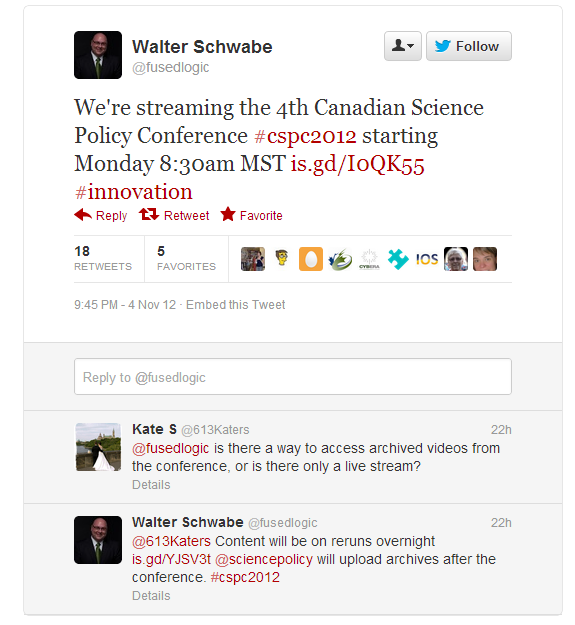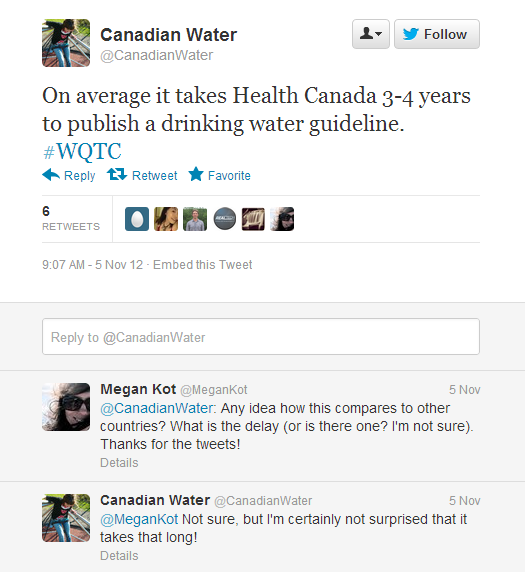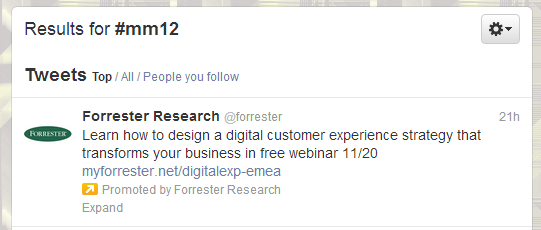Tweeting from events and around conference hashtags is a great strategy for both individuals and companies looking to build their social following and add value to their network.
This tactic requires balance, though; there is a fine line between promoting relevant content and hashtag spamming. Whether your tweets are promoted or organic, use this guide to get the best return on your time or budget investment in conference tweeting.
Conference Tweeting Netiquette
Browsing through recent event tweets gives one a fairly good idea of the level of tolerance people have for hashtags, links, and self-promotion attached to a conference. Consider these recent examples:

It’s not surprising that although this company has over 1,000 followers, they had neither a single reply nor retweet. The use of seven hashtags is obnoxious and hard on the eyes. Don’t be “that guy.”
Here’s another example, this one with a far better outcome. This company is promoting their own work; they want conference users to watch the event on their own website. Is this altruistic, the offering of free information with no potential payoff whatsoever? Not a chance. They’re building their following and promoting their brand. This time, it worked, earning the tweet two replies, five favorites and 18 retweets:

There’s nothing particularly wrong with this next tweet. It’s relevant, it doesn’t abuse hashtags, it’s brief and to the point. It’s also a missed opportunity, though. Your hashtagged tweet appears in front of all conference participants using the tag. Who are you? are you going to tweet information about the event and should I follow you to keep up? Why do I care that you’re going? Will your followers want to tune you out for the next couple of days if they’re not interested in the topic?
This tweet could have told readers so much more and kept within the character limit. As it is, it’s just appearing in the event stream for the sake of appearing there:

Use humor, insight, or exclusive info to make your event tweets more interesting. Seriously, did you see some of the topics of these conferences? We get all excited about tweeting at marketing conferences, but we’re not exactly normal, in the grand scheme of things. If your conference is an industry event for waste water sanitation specialists or cancer doctors, you’re going to have to use your good judgment and come up with a way to present information that catches the attention of your target audience without going too far, into unprofessionalism.
This next account belongs to a magazine, whose editor is attending the Water Quality Technology Conference & Expo. This attendee has mastered the technique of offering highlights and soundbites from the event their followers are likely to find highly relevant. She is the conference attendee equivalent of a Lisa Barone or a Lauren Litwinka in the marketing world.

This participant tweets interesting facts and is sure to respond to questions about the content. She is the eyes and ears for followers who can’t attend the event. She wins over new followers because of this.
Conference tweeting takeaways:
- Limit your tagging to the conference hashtag plus one other, if necessary.
- Offer valuable information by way of access to content from or around the conference.
- Take advantage of the exposure inherent to appearing in hashtag searches to let people know who you are and why they should follow along.
- Share your insight with followers and catch the attention of influencers by promoting their conference work by live tweeting.
- Use software like TweetChat to keep up with all conversation around the event hashtag and monitor your mentions so you don’t miss an opportunity to respond.
Promoting Tweets Around Event Hashtags: A Lesson in Relevance & Moderation
At various events over the past year, I’ve seen one name consistently pop up in Promoted Tweets attached to marketing conference hashtags: B2B demand generation software firm Optify.
That’s not to say they’re the only ones doing this; Forrester Research promoted a tweet about an upcoming webinar during an event I was at last week, in which they targeted the hashtag. They offered registration for a free upcoming webinar, which does fall into the category of something these conference participants might find useful.

Personally, I don’t find promoted tweets offensive, though I’ve heard whispers (and the odd shout) to the contrary. I figure, if they’ve been using this strategy to promote their business at the number of events I’ve noticed, it must be working for them. We spoke with Optify’s Marketing Manager Jennifer Wong to learn more about their hashtag marketing strategy.
She confirmed Optify has found this quite effective for raising awareness around events and also for lead generation. Wong and her team formulate their plan a few months in advance, researching upcoming events to see if the audience is a good match with people who might be interested in their software. They have actually done a case study with Twitter to gauge how effective Twitter ads are in generating leads.
“We’ve had a lot of feedback about this strategy. Conference attendees have engaged with us on Twitter and we see that people are visiting our site and downloading material, so that is positive reinforcement for us that it’s working,” said Wong. “We do get the odd criticism for ‘piggy-backing’ on other people’s hashtags, but the positive feedback and own our tests indicate most users are tolerant of this method of social advertising.”
Promoted Tweets are a fairly new method marketing in the already unknown territory that is social advertising. Optify try to ensure their ads are not offensive or intrusive; the object is to add value to the conversation and balance their paid strategy with organic tweets that offer information or follow up on questions raised by their ads. To that end, their Promoted Tweets may offer access to a relevant download, or link to a blog post about the event.
“If it’s not right for the audience based on feedback we’re getting,I can change that in real-time,” said Wong. She also notes that in one instance where she was contacted by an event organizer and asked to pull Optify’s promoted tweets for the day, she did accommodate the request. Still, she said, “All is fair in paid media. This is how we spend our budget in the most targeted way possible, with the best ROI.”
Promoted Tweet Takeaways:
- Add value to the conversation through access to information, event highlights, or commentary.
- Promote tweets only around the hashtags of relevant events; it must be relevant to your audience, and vice versa.
- Balance your paid tweet strategy with organic, authentic interactions.
- Be open to feedback from attendees, organizers, and your own followers. The worst thing you can do during an active, real-time conversation is “set it and forget it.”
- Check out Jennifer’s case study, Real-Time Social Media Marketing for an Offline Event, for more insight on which metrics and performance measures you should be monitoring.
Bring your questions about Promoted Tweets to the SES Chicago Leveraging Twitter & Facebook Ads session on Thursday at 10:45am.
Do you have tips on event tweeting? Share them with other readers in the comments!




